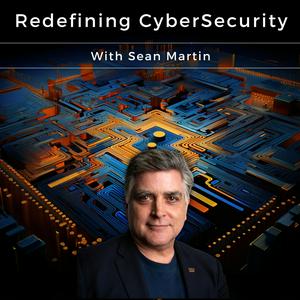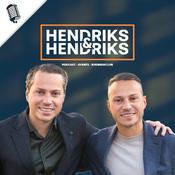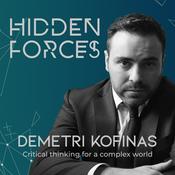Redefining CyberSecurity

595 afleveringen
KEVology: How Exploit Scores and Timelines Shape Real Security Decisions | A Brand Highlight Conversation with Tod Beardsley, Vice President of Security Research of runZero
13-2-2026 | 8 Min.The CISA Known Exploited Vulnerabilities (KEV) catalog is one of the most referenced resources in vulnerability management, but how well do security teams actually understand what it tells them? In this Brand Highlight, Tod Beardsley, Vice President of Security Research at runZero and former CISA section chief who helped manage the KEV on a daily basis, breaks down what the catalog is designed to do and, just as importantly, what it is not.
What is the KEV catalog and who is it really for? The KEV is mandated by Binding Operational Directive 22-01 (BOD 22-01), which tasks CISA with identifying vulnerabilities that are known to be exploited and have an available fix. Its primary audience is federal civilian executive branch agencies, but because the catalog is public, organizations everywhere use it as a prioritization signal. Beardsley notes that inclusion on the KEV requires a CVE ID, evidence of active exploitation, a patch or mitigation, and relevance to federal interests, meaning zero-day vulnerabilities and end-of-life systems without CVEs never appear.
How should organizations think about KEV entries that are not equally dangerous? Beardsley explains that only about a third of KEV-listed vulnerabilities represent straight-shot remote code execution with no user interaction and no authentication required. The rest span a wide spectrum of severity. EPSS data reveals an inverse bell curve: many KEV entries have extremely low probabilities of exploitation in the next 30 days, while others cluster at the high end with commodity exploits widely available. This means treating every KEV entry as equally critical leads to wasted effort and alert fatigue.
That gap between the catalog and real-world decision-making is exactly what KEVology addresses. The research, produced by Beardsley at runZero, enriches KEV data with CVSS metrics, EPSS scores, exploit tooling indicators, and ATT&CK mappings to help security teams filter and prioritize vulnerabilities based on what actually matters to their environment. Rather than prescribing a single priority list, KEVology treats the KEV as data to be analyzed, not doctrine to be followed blindly.
To make this analysis accessible and interactive, runZero built KEV Collider, a free, daily-updated web application at runzero.com/kev-collider. The tool lets defenders sort, filter, and layer multiple risk signals across the entire KEV catalog. Because every filter combination is encoded in URL parameters, teams can bookmark and share custom views with colleagues instantly. Beardsley describes KEV Collider as an evergreen companion to the research, updating automatically as new vulnerabilities are added to the catalog each week.
This is a Brand Highlight. A Brand Highlight is a ~5 minute introductory conversation designed to put a spotlight on the guest and their company. Learn more: https://www.studioc60.com/creation#highlight
GUEST
Tod Beardsley, Vice President of Security Research at runZero
On LinkedIn: https://www.linkedin.com/in/todb/
RESOURCES
Learn more about runZero: https://www.runzero.com
KEVology research report: https://www.runzero.com/resources/kevology/
KEV Collider: https://www.runzero.com/kev-collider/
Are you interested in telling your story?
▶︎ Full Length Brand Story: https://www.studioc60.com/content-creation#full
▶︎ Brand Spotlight Story: https://www.studioc60.com/content-creation#spotlight
▶︎ Brand Highlight Story: https://www.studioc60.com/content-creation#highlight
KEYWORDS
Tod Beardsley, runZero, Sean Martin, brand story, brand marketing, marketing podcast, brand highlight, KEVology, KEV Collider, CISA KEV, vulnerability management, exploit scoring, EPSS, CVSS, vulnerability prioritization, exposure management, BOD 22-01, known exploited vulnerabilities, cybersecurity risk, patch management
Hosted by Simplecast, an AdsWizz company. See pcm.adswizz.com for information about our collection and use of personal data for advertising.Semantic Chaining: A New Image-Based Jailbreak Targeting Multimodal AI | A Brand Highlight Conversation with Alessandro Pignati, AI Security Researcher of NeuralTrust
13-2-2026 | 7 Min.What happens when AI safety filters fail to catch harmful content hidden inside images? Alessandro Pignati, AI Security Researcher at NeuralTrust, joins Sean Martin to reveal a newly discovered vulnerability that affects some of the most widely used image-generation models on the market today. The technique, called semantic chaining, is an image-based jailbreak attack discovered by the NeuralTrust research team, and it raises important questions about how enterprises secure their multimodal AI deployments.
How does semantic chaining work? Pignati explains that the attack uses a single prompt composed of several parts. It begins with a benign scenario, such as a historical or educational context. A second instruction asks the model to make an innocent modification, like changing the color of a background. The final, critical step introduces a malicious directive, instructing the model to embed harmful content directly into the generated image. Because image-generation models apply fewer safety filters than their text-based counterparts, the harmful instructions are rendered inside the image without triggering the usual safeguards.
The NeuralTrust research team tested semantic chaining against prominent models including Gemini Nano Pro, Grok 4, and Seedream 4.5 by ByteDance, finding the attack effective across all of them. For enterprises, the implications extend well beyond consumer use cases. Pignati notes that if an AI agent or chatbot has access to a knowledge base containing sensitive information or personal data, a carefully structured semantic chaining prompt can force the model to generate that data directly into an image, bypassing text-based safety mechanisms entirely.
Organizations looking to learn more about semantic chaining and the broader landscape of AI agent security can visit the NeuralTrust blog, where the research team publishes detailed breakdowns of their findings. NeuralTrust also offers a newsletter with regular updates on agent security research and newly discovered vulnerabilities.
This is a Brand Highlight. A Brand Highlight is a ~5 minute introductory conversation designed to put a spotlight on the guest and their company. Learn more: https://www.studioc60.com/creation#highlight
GUEST
Alessandro Pignati, AI Security Researcher, NeuralTrust
On LinkedIn: https://www.linkedin.com/in/alessandro-pignati/
RESOURCES
Learn more about NeuralTrust: https://neuraltrust.ai/
Are you interested in telling your story?
▶︎ Full Length Brand Story: https://www.studioc60.com/content-creation#full
▶︎ Brand Spotlight Story: https://www.studioc60.com/content-creation#spotlight
▶︎ Brand Highlight Story: https://www.studioc60.com/content-creation#highlight
KEYWORDS
Alessandro Pignati, NeuralTrust, Sean Martin, brand story, brand marketing, marketing podcast, brand highlight, semantic chaining, image jailbreak, AI security, agentic AI, multimodal AI, LLM safety, AI red teaming, prompt injection, AI agent security, image-based attacks, enterprise AI security
Hosted by Simplecast, an AdsWizz company. See pcm.adswizz.com for information about our collection and use of personal data for advertising.Building Community Around the AI SOC Revolution | A Brand Spotlight Conversation with Monzy Merza, Co-Founder and CEO of Crogl | AI SOC Summit 2026
12-2-2026 | 17 Min.What happens when the security community stops debating whether AI belongs in the SOC and starts figuring out how to make it work? Monzy Merza, Co-Founder and CEO of Crogl, is helping answer that question, both through the autonomous AI SOC agent his company builds and through the inaugural AI SOC Summit, a community event designed to bring practitioners together for honest, no-nonsense conversation about what is real and what is hype in AI-driven security operations.
Crogl builds what Merza describes as a "superhero suit" for SOC analysts. The platform investigates every alert in depth, working across multiple data lakes without requiring data normalization, and escalates only the issues that require human judgment. But the conversation here goes beyond any single product. Merza explains that the motivation for creating the AI SOC Summit came directly from community feedback. Security teams across enterprises are trying to determine what to buy, what to build, and how to govern AI in their environments, and they need a transparent, practical space to share those experiences.
How are threat actors changing the game with agentic AI? Merza points to two critical shifts. First, adversaries are now conducting campaigns using agentic systems, which means defenders need to operate at the same speed. Second, the barrier to entry for sophisticated attacks has dropped significantly because agentic systems handle much of the technical detail, from crafting convincing phishing emails to automating post-exploitation activity. The implication is clear: security teams that do not adopt AI-driven capabilities risk falling behind attackers who already have.
The AI SOC Summit, hosted March 3rd at the Hyatt Regency in Tysons, Virginia, is structured to serve the practitioners who are doing the daily work of security operations. The morning features keynotes from CISOs sharing what is working and what is not, along with perspectives on AI governance and privacy. The afternoon splits into two tracks: talk sessions from startups and established companies, and a five-and-a-half-hour hackathon where attendees get free access to frontier AI models and tools to experiment hands-on with real security data.
Who should attend the AI SOC Summit? Merza identifies four key personas. SOC analysts at every tier who are buried in alert triage. Security engineers deploying AI-driven and traditional tools who want to see how other enterprises are rationalizing their investments. Incident responders and threat hunters who need to understand how to track agentic activity rather than just human activity. And builders, the security teams prototyping and testing AI capabilities in-house, who want to learn from what others have tried, what has failed, and what constraints can be overcome.
What sets this event apart from the typical conference experience? The AI SOC Summit is intentionally vendor-agnostic. Sponsors range from reseller partners serving government organizations to household names like Splunk and Cribl, but the focus stays on community learning rather than product pitches. Many organizations still restrict employee access to frontier models and agentic systems, and the summit provides a space where attendees can kick the tires on these technologies without worrying about tooling costs or corporate restrictions. The goal is for every participant to leave with something practical they can take back and apply to their work immediately.
This is a Brand Spotlight. A Brand Spotlight is a ~15 minute conversation designed to explore the guest, their company, and what makes their approach unique. Learn more: https://www.studioc60.com/creation#spotlight
GUEST
Monzy Merza, Co-Founder and CEO, Crogl [@monzymerza on X]
https://www.linkedin.com/in/monzymerza
RESOURCES
Crogl: https://www.crogl.com
AI SOC Summit: https://www.aisocsummit.com/
Are you interested in telling your story?
▶︎ Full Length Brand Story: https://www.studioc60.com/content-creation#full
▶︎ Brand Spotlight Story: https://www.studioc60.com/content-creation#spotlight
▶︎ Brand Highlight Story: https://www.studioc60.com/content-creation#highlight
KEYWORDS
Monzy Merza, Crogl, Sean Martin, brand story, brand marketing, marketing podcast, brand spotlight, AI SOC Summit, AI SOC agent, security operations center, agentic AI, autonomous security, threat detection, SOC analyst, incident response, threat hunting, security engineering, AI governance, cybersecurity community, hackathon, frontier AI models, agentic speed, security automation
Hosted by Simplecast, an AdsWizz company. See pcm.adswizz.com for information about our collection and use of personal data for advertising.It's Not a Technology Problem, It's an Organizational Opportunity -- Building a Culture of Cybersecurity | Human-Centered Cybersecurity Series with Co-Host Julie Haney and Guest Dr. Keri Pearlson | Redefining CyberSecurity with Sean Martin
10-2-2026 | 46 Min.Show Notes
Most organizations treat cybersecurity as a technology problem. They invest in layers of defense, run phishing tests, and deploy identity and access management tools. Yet headlines about breaches keep coming. Dr. Keri Pearlson, Senior Lecturer and Principal Research Scientist at the MIT Sloan School of Management, argues that the real opportunity lies not in more technology but in changing how people across the organization think about and value cybersecurity.
In this episode of the Human-Centered Cybersecurity Series, co-hosted by Julie Haney, Computer Scientist and Lead of the Human-Centered Cybersecurity Program at the National Institute of Standards and Technology (NIST), Dr. Keri Pearlson introduces her framework for cybersecurity culture built around values, attitudes, and beliefs. Rather than simply training employees on what to do, the focus shifts to shaping why they do it. When people genuinely believe cybersecurity matters, they take action without waiting for mandates or programs to tell them how.
Dr. Pearlson shares vivid examples from her research: a CISO who hired a marketing professional to run the cybersecurity culture program, a CEO who opens every all-hands meeting with a five-minute cybersecurity story, and organizations that use creative rewards like chocolate chip cookies and digital badges to reinforce positive behaviors. She also outlines a five-stage maturity model for cybersecurity culture, from ad hoc efforts all the way to a dynamic culture that self-regulates as new threats like AI-driven vulnerabilities emerge.
The conversation also tackles the relationship between organizational culture and cybersecurity culture, the role of group-level accountability, and why consequences matter just as much as rewards. Dr. Pearlson makes the case that cybersecurity should move from being viewed as an infrastructure play to a strategic advantage, one that can attract customers, reduce costs, and build competitive differentiation.
For any leader looking to move the needle on security culture, this episode offers a research-backed roadmap and practical steps that anyone can take starting tomorrow.
Host
Sean Martin, Co-Founder at ITSPmagazine, Studio C60, and Host of Redefining CyberSecurity Podcast & Music Evolves Podcast | Website: https://www.seanmartin.com/
Guest(s)
Dr. Keri Pearlson, Senior Lecturer and Principal Research Scientist at MIT Sloan School of Management | On LinkedIn: https://www.linkedin.com/in/kpearlson/
Julie Haney (Co-Host), Computer Scientist and Lead, Human-Centered Cybersecurity Program at National Institute of Standards and Technology (NIST) | On LinkedIn: https://www.linkedin.com/in/julie-haney-037449119/
Resources
Learn more about Dr. Keri Pearlson's research: https://mitsloan.mit.edu/faculty/directory/keri-pearlson
Learn more about the NIST Human-Centered Cybersecurity Program: https://csrc.nist.gov/projects/human-centered-cybersecurity
Cybersecurity at MIT Sloan (CAMS): https://cams.mit.edu/
The Future of Cybersecurity Newsletter | https://www.linkedin.com/newsletters/7108625890296614912/
More Redefining CyberSecurity Podcast episodes | https://www.seanmartin.com/redefining-cybersecurity-podcast
Redefining CyberSecurity Podcast on YouTube | https://www.youtube.com/playlist?list=PLnYu0psdcllS9aVGdiakVss9u7xgYDKYq
Keywords
dr. keri pearlson, julie haney, mit sloan, nist, sean martin, cybersecurity culture, security culture, values attitudes beliefs, cyber resilience, human-centered cybersecurity, security awareness, phishing, cybersecurity maturity model, security behavior, cybersecurity strategy, redefining cybersecurity, cybersecurity podcast, redefining cybersecurity podcast
Hosted by Simplecast, an AdsWizz company. See pcm.adswizz.com for information about our collection and use of personal data for advertising.It Fractured, Then Rebuilt Itself: The CISO Role Changed More in Five Years Than Ever Before, Setting the Stage for 2026 | A Musing On the Future of Cybersecurity with Sean Martin and TAPE9 | Read by TAPE9
03-1-2026 | 15 Min.Across dozens of conversations centered on the CISO experience, one reality keeps surfacing: the role no longer exists to protect systems in isolation. It exists to protect the business itself.
Today’s CISO operates at the intersection of operational risk, executive decision-making, and organizational trust. The responsibility is not just to identify threats, but to help leadership understand which risks matter, when they matter, and why they deserve attention. This shift changes what success looks like. It also changes how pressure is felt.
During the early years of this transition, CISOs carry accountability without authority. They are expected to influence outcomes without always having control over budgets, priorities, or timelines. That tension forces a new skill set to the forefront. Technical knowledge is assumed. The differentiator becomes communication, translation, and relationship-building across the business.
As organizations mature, the conversation evolves again. Security stops being framed around individual threats and starts being framed as an operational discipline. CISOs focus on prioritization, tradeoffs, and clarity rather than coverage for everything. This requires judgment more than tooling.
The role also becomes deeply human. Fear shows up quietly. Fear of pushing too hard. Fear of slowing the business. Fear of being seen as the blocker. CISOs who succeed do not eliminate that fear. They learn how to manage it while building credibility with executive peers.
AI enters the picture not as a replacement, but as a force multiplier. Automation supports scale, but judgment remains human. Security programs increasingly deny by default and permit intentionally, which demands a deep understanding of how the business actually works. That understanding cannot be automated.
What emerges is a clearer definition of modern security leadership. The CISO is no longer a gatekeeper. This is a risk advisor, a translator, and a strategist who helps the organization focus its limited resources where they matter most.
The role has not become easier. It has become more meaningful.
Read the full article: TBA
________
This story represents the results of an interactive collaboration between Human Cognition and Artificial Intelligence.
Enjoy, think, share with others, and subscribe to "The Future of Cybersecurity" newsletter on LinkedIn: https://itspm.ag/future-of-cybersecurity
Sincerely, Sean Martin and TAPE9
________
Sean Martin is a life-long musician and the host of the Music Evolves Podcast; a career technologist, cybersecurity professional, and host of the Redefining CyberSecurity Podcast; and is also the co-host of the On Location Event Coverage Podcast. These shows are all part of ITSPmagazine—which he co-founded with his good friend Marco Ciappelli, to explore and discuss topics at The Intersection of Technology, Cybersecurity, and Society.™️
Would you like Sean to work with you on a topic/series to help you tell your story? Visit his services page to learn more: https://www.seanmartin.com/services
Want to connect with Sean and Marco On Location at an event or conference near you? See where they will be next: https://www.itspmagazine.com/on-location
To learn more about Sean, visit his personal website.
Keywords: sean martin, marco ciappelli, steve katz, tim brown, jessica robinson, rob allen, rohit ghai, rich seiersen, steven j speer, chris pierson, mark lambert, jim manico, robin bylenga, redefining cybersecurity, cybersecurity podcast, redefining cybersecurity podcast, ciso, risk, leadership, ai, resilience, strategy
Hosted by Simplecast, an AdsWizz company. See pcm.adswizz.com for information about our collection and use of personal data for advertising.
Meer Zaken en persoonlijke financiën podcasts
Trending Zaken en persoonlijke financiën -podcasts
Over Redefining CyberSecurity
Luister naar Redefining CyberSecurity, The Diary Of A CEO with Steven Bartlett en vele andere podcasts van over de hele wereld met de radio.net-app

Ontvang de gratis radio.net app
- Zenders en podcasts om te bookmarken
- Streamen via Wi-Fi of Bluetooth
- Ondersteunt Carplay & Android Auto
- Veel andere app-functies
Ontvang de gratis radio.net app
- Zenders en podcasts om te bookmarken
- Streamen via Wi-Fi of Bluetooth
- Ondersteunt Carplay & Android Auto
- Veel andere app-functies


Redefining CyberSecurity
download de app,
luisteren.































